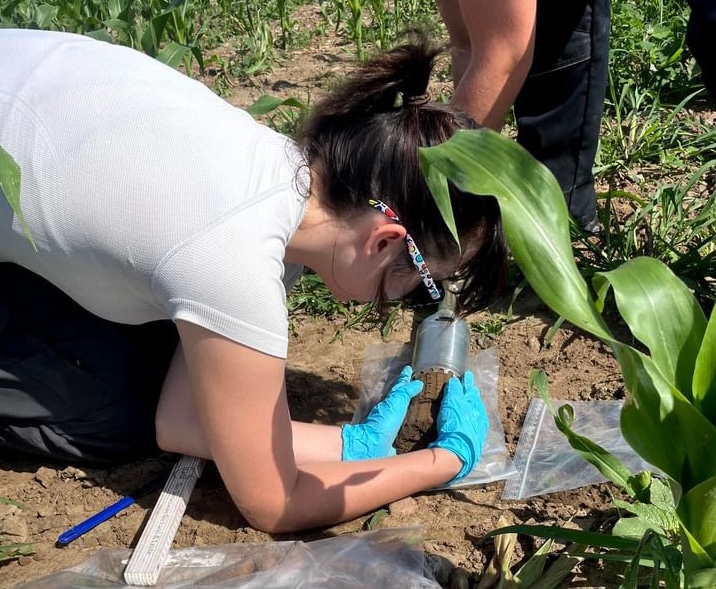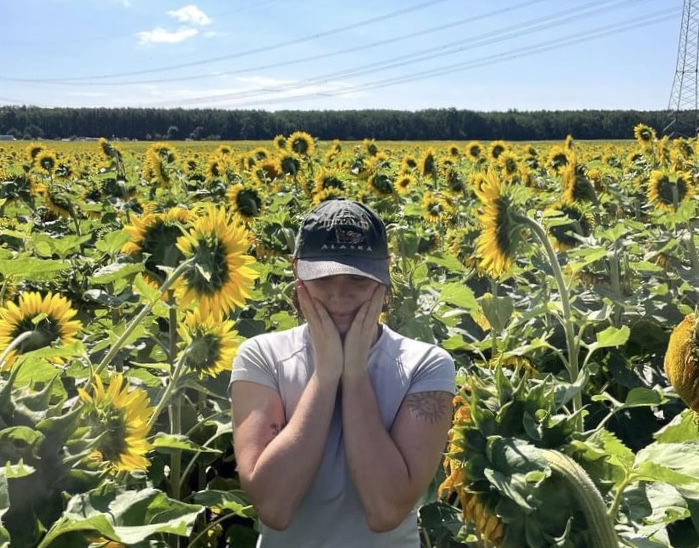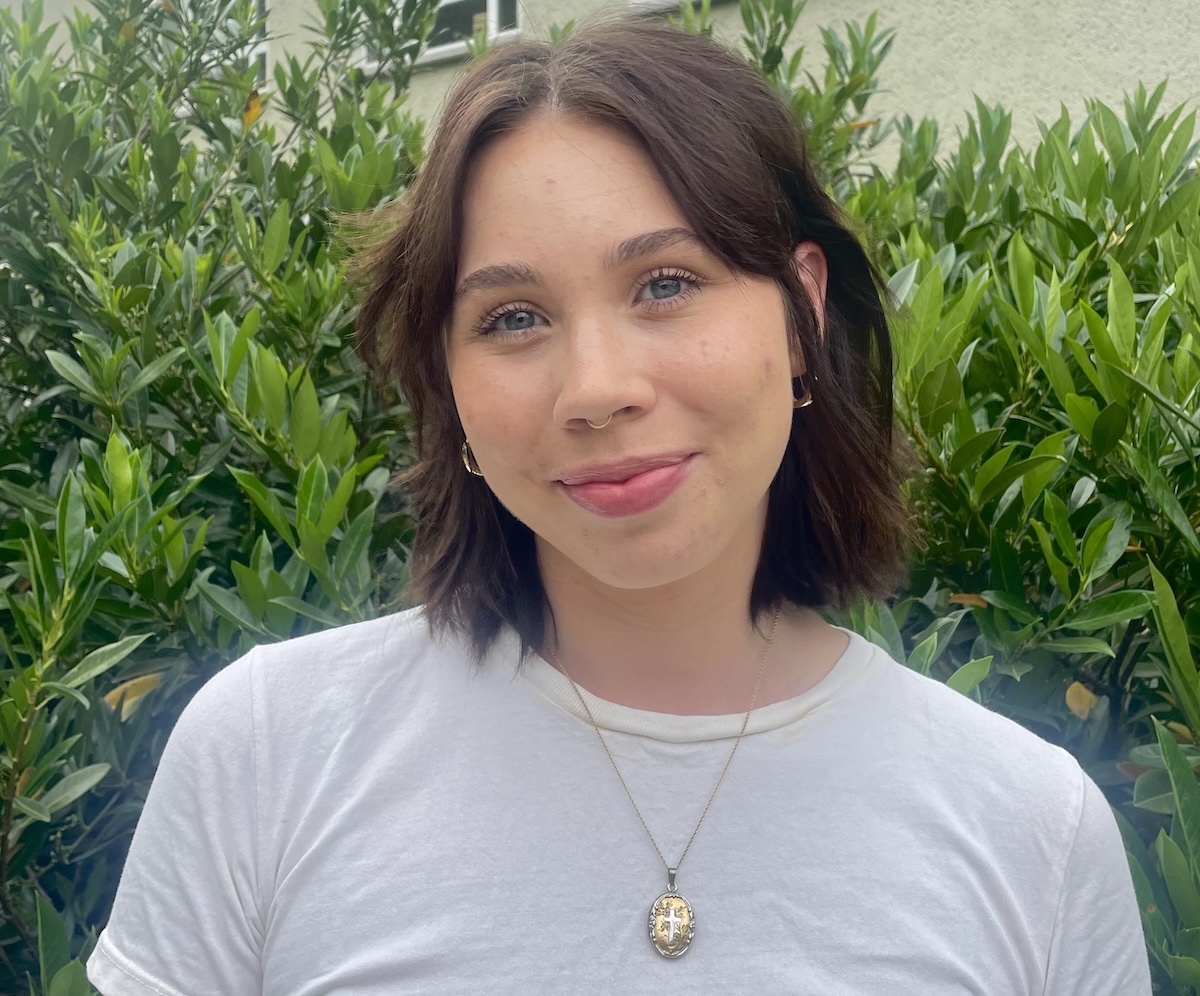Initially studying Molecular Biology and then Microbiology, UBC Okanagan student Emily switched to Biology because it gave her the flexibility to explore a wider range of topics and helped to keep her options open for the future.
Emily says that the highlight of her degree has been all of the hands-on experiences she’s been involved in, including research, co-op, and an internship in Germany where she explored how field robots could improve soil health. All of these opportunities have made her confident in her ability to transition from school to industry.
1. What made you decide to major in Biology?
Coming out of high school, I was really curious about how smaller systems work together to create larger ones. I had a tough time choosing a major because I was equally passionate about physics and math, but I ultimately chose biology because of its versatility. It connects to so many different scientific fields, so I never felt boxed into just one area of study. I started my first two years at Grant MacEwan University in Edmonton, studying Molecular Biology. After transferring to UBC, I initially majored in Microbiology, but I quickly realized it was more restrictive than I expected. I wanted the freedom to explore a wider range of topics, like human biology and ecology, to get a better sense of where I saw myself after graduation. Switching to Biology gave me that flexibility and allowed me to shape my education around my interests while keeping my options open for the future.
2. What has been your experience in the program so far?
Honestly, my experience in the Biology program has been really rewarding. UBC Okanagan offers so many opportunities to learn and grow, both inside and outside the classroom, and I’ve tried to take full advantage of them. Some of my favourite courses so far have been Environmental Microbiology and Cell Physiology, both having challenged me to think critically and deepen my understanding of complex biological systems.
Beyond coursework, getting involved in research has been a huge highlight. Between my directed studies in the Complex Environmental Systems Lab and my honours thesis in the Microbial Ecology Lab, I’ve been able to work alongside faculty, graduate students, and peers, building valuable connections across campus. These hands-on experiences have made everything I’ve learned in class feel so much more tangible, and they’ve really solidified my interest in research.

Emily in the study field, collecting composite soil samples with a 30cm soil corer to separate the core into three distinct depths. She used these samples to measure aggregate stability at each depth, a major soil health indicator.
3. Currently you’re on a co-op. What has that experience been like?
Participating in the co-op program has completely shaped the trajectory of my degree. I feel incredibly fortunate that the Summerland Research and Development Centre is located so close to UBCO, as it allowed me to complete all three of my co-op terms there. Each term, I had the opportunity to work in different labs with various scientists, gaining exposure over a range of research projects and methodologies. This experience not only helped me develop technical skills, such as laboratory techniques and experimental design, but also strengthened my soft skills, including teamwork, communication, and problem-solving. It gave me invaluable insights into potential career paths and work environments post-graduation, and I feel much more confident in my ability to transition from academia to industry or research-based roles.
I highly recommend the co-op program to anyone in the sciences as it provides hands-on experience, networking opportunities, and a level of professional growth that’s hard to replicate in a classroom setting.
4. You won a Mitacs scholarship last year. What was that like?
Winning a Mitacs scholarship was an incredible opportunity that allowed me to take my research beyond Canada and gain hands-on experience in an international setting. Through the program, I interned at the Leibniz-Centre for Agricultural Landscape Research (ZALF) in Germany, working with the SoilRob junior research group. Our goal was to explore how autonomous field robots could improve soil health in diverse agricultural landscapes.
The experience was both challenging and rewarding. I got to assist in field campaigns, apply various soil evaluation methods, and help refine data collection strategies to make them practical across different agricultural contexts. Working in an interdisciplinary, international team really strengthened my ability to collaborate across cultures and scientific backgrounds. Beyond the technical skills I gained, the internship opened my eyes to the global challenges in sustainable agriculture and soil management. It reinforced my passion for research that connects technology and environmental science. The Mitacs program not only gave me valuable work experience and networking opportunities but also shaped the way I think about scientific research on a broader scale.

5. Do you have any tips or advice for getting the most out of a UBC experience?
Absolutely! My biggest piece of advice is to take advantage of every opportunity that comes your way whether it’s research, co-op, extracurricular activities, or networking events. UBCO offers so many ways to get involved, and the more you put yourself out there, the more you’ll gain from the experience. If you’re interested in research, don’t be afraid to reach out to professors, even if you don’t have prior lab experience. Many faculty members are open to mentoring students who are eager to learn and getting involved in research early can open doors to scholarships, conference presentations, and even publications. I also highly recommend participating in the co-op program or other work-integrated learning opportunities. These experiences give you a clearer sense of what career paths might interest you while helping you build essential skills and professional connections.
Finally, balance is key. While academics are important, make sure to enjoy your time at UBC by joining clubs, attending events, and exploring the community. University is as much about personal growth as it is about academic achievement, so make the most of it!
